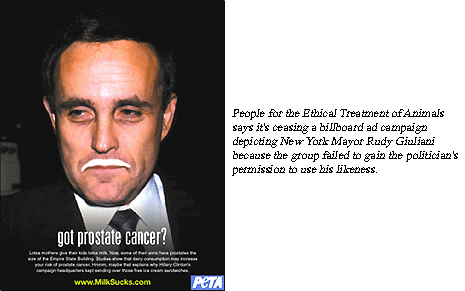PETA pulling anti-milk ads

An animal-rights advocate group that sponsored anti-milk billboards depicting New York Mayor Rudy Giuliani says the advertisements are being pulled.
People for the Ethical Treatment of Animals had placed two mock Got Milk? ads in Wisconsin showing the mayor with a milk mustache and the query, "Got Prostate Cancer?"
"Lotsa mothers give their kids lotsa milk," the ad reads. "Now, some of their sons have prostates the size of the Empire State Building. Studies show that dairy consumption may increase your risk of prostate cancer. Hmmm, maybe that explains why Hillary Clinton's campaign headquarters kept sending over those ice cream sandwiches."
Giuliani, who has been diagnosed with prostate cancer, criticized PETA for "exploiting his illness," Associated Press reported, and for using his prominent position for its own advertising efforts.
Labeling the ad "completely tasteless and insensitive," National Dairy Council and National Fluid Milk Processor leaders said the effort exploits Giuliani's battle with prostate cancer. "Once again, PETA is using outrageous tactics to further its animal rights agenda, regardless of the nutritional consequences to the American public," the groups said in a joint statement.

PETA spokesman Bruce Friedrich said the ads would be removed because the organization failed to gain the mayor's permission to utilize his image.
The group also is running the website www.milksucks.com in which it tells users: "Worried about prostate cancer? Wipe off that Milk Mustache!" On the site, PETA says that 11 studies have linked dairy consumption to prostate cancer according to the World Cancer Research Fund and the American Institute for Cancer Research.
In early June, a study by a team of British researchers concluded that entirely avoiding consuming dairy products as well as meat might decrease men's risk of contracting prostate cancer. Scientists from the Imperial Cancer Research Fund, which conducted the research, did recommend, however, that additional research be conducted into the apparent connection. (See related article).
In April, a U.S. study was released indicating that men consuming dairy-rich diets might face increased risk of suffering prostate cancer.
The research, presented at the American Assn. for Cancer Research's annual meeting, indicates that a "moderate elevation" in prostate cancer risk is linked to ingesting "higher intakes" of dairy products and dairy calcium.
In addition, males drinking more than six glasses of milk weekly experienced lower levels of the "potentially protective" form of vitamin D vs. men drinking less than two glass a week.
Again, scientists were cautious about claiming a direct, unquestionable link, stating that more research is needed to confirm the findings. (See related article).
PETA cites the results of the Physicians' Health Study in asserting a link between dairy consumption and prostate cancer. The study of 20,885 physicians determined that men consuming a minimum of 2.5 servings of dairy foods daily were roughly 30% more likely to develop the disease vs. men whose average daily dairy consumption was less than half a serving.
But NDC and NFMP leaders argued that those test results aren't conclusive.
"(The study), which PETA uses as the backbone for its allegations about milk and prostate cancer, is a very preliminary ‘observational' study, which does not show a cause-and-effect relationship," the groups' leaders said. "The authors specifically caution within the text of the study that men should not eat less dairy or drink less milk. In fact, the authors clearly state that more research is needed to confirm their findings."
The Milk Mustache campaign recently has come under fire from the pro-vegetarian group Physicians Committee for Responsible Medicine, which charges that the spots contain false, misleading and sometimes fraudulent health claims. (See related article).
In July, the group filed a complaint with the Federal Trade Commission calling for an "immediate investigation" into the celebrity-featuring advertisements.
Dairy industry leaders dismissed the move as a "publicity stunt" that uses "junk science and misinformation" in attempting to discredit the industry.
Edited by Gerry Clark
